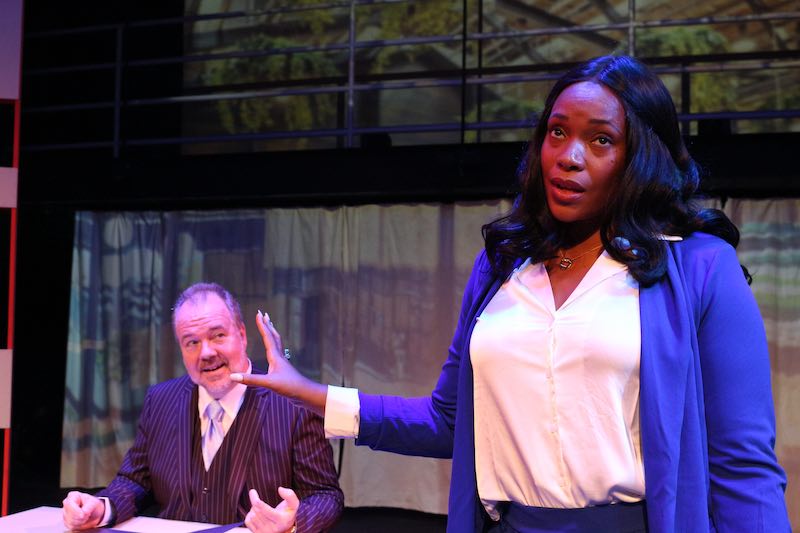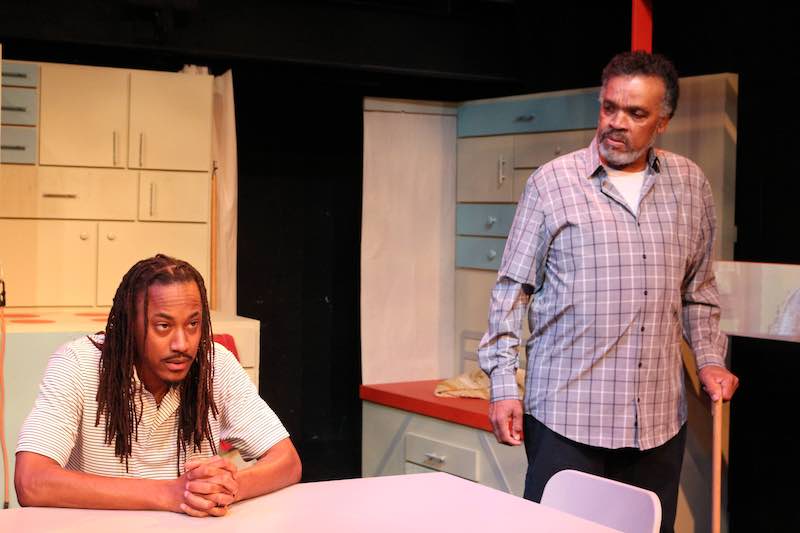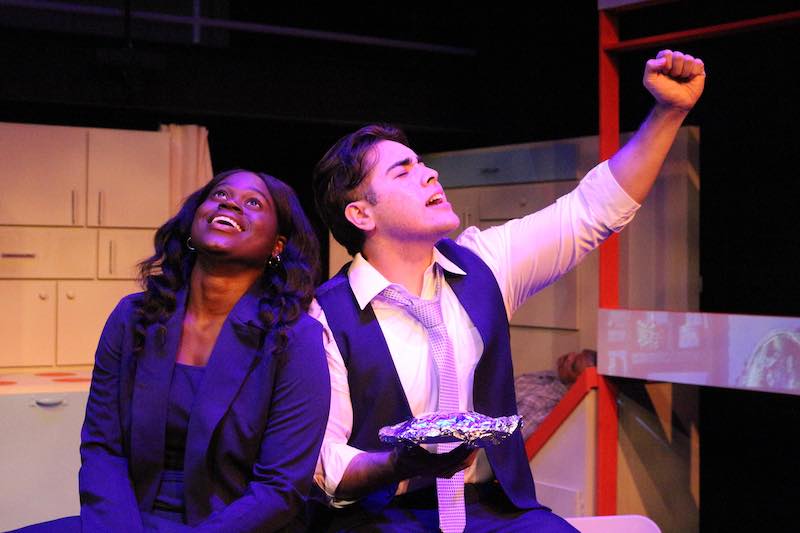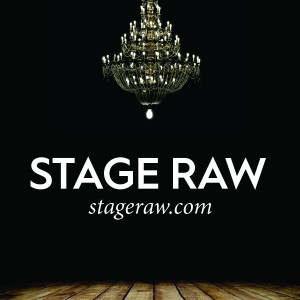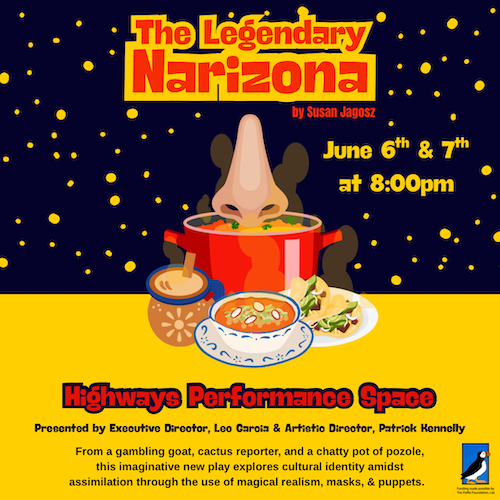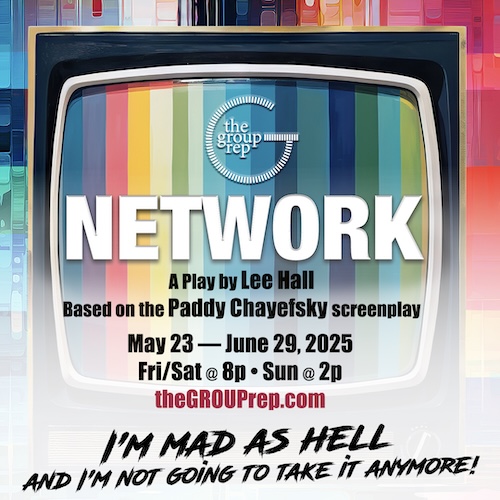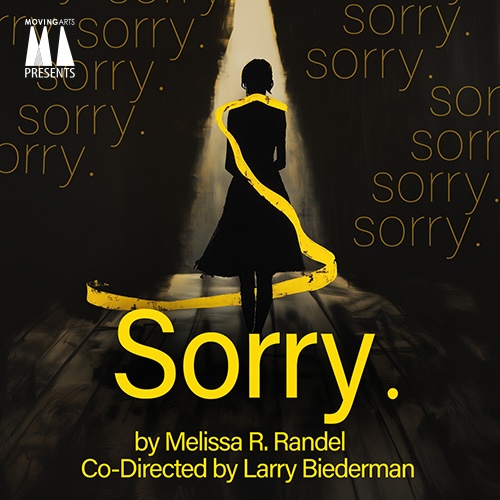
Image above: Rob Nagle and Geri Nikole-Love in Road Theatre Company’s production of “Robbin, from The Hood” (All production photos by Lizzy Kimball)
Past, Present, and, Uh Oh
Reflections on Marlow Wyatt’s “Robbin, from the Hood”
By Matthew Beymer
This article is part of the Stage Raw/Unusual Suspects Youth Journalism Fellowship
This past September, in the midst of the madness of orientation week, UCLA’s Theater department hosted a community-wide event with Support Black Theatre, a service organization based in Los Angeles. A handful of students gathered as we watched two of our classmates perform a selection from the brilliant playwright Marlow Wyatt’s Robbin, from the Hood. In this scene, protagonist and math whizz Robbin Woods and her artistic best friend Juan Rodriguez discuss the changes in their lives after securing internships with mega corporation Kennedy Global, known colloquially as KG.
Suddenly, the focus of the room shifted as we began to engage in a “talk forward,” Support Black Theatre’s temporal opposite of the popular “talk back” that follows a theater performance. Instead of providing the opportunity to engage with theater makers once a dramatic project is set, the “talk forward” gives communities the chance to inform the playwright and/or their collaborators directly of the mosaic of lived experiences that may relate to their play’s material. Our conversations about love in the Black and Brown communities as represented in Wyatt’s play – along with the reactions of youth to capitalism – fostered a thoughtful and compelling conversation across many generations and cultural backgrounds. Our “talk forward” experience reminded me of the lack of intergenerational dialogue in the theater industry, not just for artists but especially for audiences. I believe the future of live theater requires a stronger investment in intergenerational dialogue, a phenomenon that occurs beautifully both on and off stage in Robbin, From the Hood, presented by the Road Theatre Company in North Hollywood.
Restorative justice trainer Kazu Haga recently shared in his book Healing Resistance: “If we carry intergenerational trauma (and we do), then we also carry intergenerational wisdom. It’s in our genes and in our DNA.” Wyatt tinkers with both edges of this sword to shape the dynamic of the Woods family, now made up of just Robbin (iesha m. daniels) and her grandfather Percy (William L. Warren) after her parents passed away in a car accident and her uncle Charles “Charlie” (Joshua R. Lamont) re-entered the carceral system. As Percy lives with dementia, his dialogue with his granddaughter is often wise but sometimes difficult to understand, especially when he confuses faces and names. What he does remember vividly is the trauma of his father being placed in a chain gang, which only intensifies his fears for Charlie’s present and future.
Warren’s portrayal of Percy Woods is magnificent and heartbreaking. He brings a warmness to Percy that remains constant, even in Percy’s physically and emotionally weakest moments onstage. (As someone whose own grandfather lives with dementia, I was struck by how believable Warren’s performance was throughout the play, especially when his character experienced episodes of memory loss.) For Wyatt, Percy is partially based on her own grandfather, but he also represents a constant of Wyatt’s childhood experience of “Black men showing love,” which she recounted in the talk back for the Sunday performance I attended. For Warren, Percy is a figure of “stability, strength, love, and endurance” who became an early patriarch to his family in the absence of his father.
Contrasting with the Woods family home is KG, an international conglomerate that beefs up and commodifies knowledge sharing while sliding traumatic realities under the rug. As Robbin and Juan (Enrike Llamas) enter the unfamiliar work environment at KG, their lack of knowledge and experience becomes weaponized against them by KG’s training lead Margaret Brown (Geri-Nikole Love), who insists that they undergo a professionalization process which consists of modifying their hairstyles, their earrings, and their clothing.
Margaret is, of course, an agent of KG, but she is also quietly critical of the organization and their relationship to low-income communities. She carries with her the wisdom gleaned from performing day-to-day in a hostile work environment, where she is challenged for her race and her gender and expected to be utterly perfect at her job. She repeats her original agreement with her higher-up Kyle (Rob Nagle), “I don’t make mistakes, I make mistakes disappear.”
Unbeknownst to Robbin, Juan, and the audience (for most of the show), Margaret also comes from a similar neighborhood and carries deep trauma from her upbringing in the foster care system. She soon becomes a mentor for Robbin, who insists on carrying out KG’s elusive community project in order to give back to her family and friends. Margaret is initially cold and even sinister to Robbin and Juan, but she remains completely transparent about the hurdles Black and Brown folks must pass over to reach her position of power. By the midpoint of the second act, she delivers the show’s guiding wisdom: “Sometimes you do the wrong thing for the right reason.” I won’t say exactly how Robbin acts on this advice, though she sure does take it to heart.
At the core of the play is the wisdom shared between Robbin and Juan, who maintain one of the strongest relationships in this story. The two are often unified in thought but divergent in action, which the play quickly reveals as they head into their respective jobs as accounting and mailroom assistants. Initially, they are united by their call to generate as much money as possible to avoid continuing their recurring side hustles, such as Robbin’s selling of her Jordans to gain back money for her grandfather and herself. The allure of capitalist and consumerist values even supersedes the teachings from their upbringings – Juan admits that part of the reason he doesn’t believe in God anymore is because God fails to find his parents jobs despite their zealous religious devotion. Robbin, on the other hand, maintains religion in her life and is able to assume a more critical perspective of KG by the end of the play. Robbin and Juan share the journey to finding what they believe is a way out of poverty, but whether they truly make it out of poverty in the long run remains undetermined.
Even with their differences, Robbin and Juan remain “contigo hasta la muerte” (with you until death), as Juan says often. Juan fosters his own intergenerational relationship with Grandpa Percy, even bringing him a birthday gift later on as he understands how lonely Percy often feels. In one particular moment in which Percy experiences heightened dementia symptoms and imagines Charlie in his kitchen, Juan pretends to be Charlie and calms Percy down so that he can go to sleep. Juan’s quick decision to “become” Charlie illustrates his ability to understand the gravity of the situation and rely on his strong wisdom, even if he is only a high school student. His strong platonic love for Robbin is fully evident in this moment because, as actor Enrike Llamas put it himself in the talk back, “Robbin needs to take care of others, but Juan wants to.”
The characters of Robbin, from the Hood are imbued with Marlow Wyatt’s personal wisdom and her sharp ability to untangle our nation’s past and presents while reflecting its culture. This includes references to old Westerns or Childish Gambino/Donald Glover’s “This is America.” She first envisioned herself writing a Robin Hood-inspired play in 2018 or 2019, in the midst of a Trump administration, long before knowing how the play would resonate in Fall 2024. Who knew the show would open mere weeks before his second victory? I can only imagine how the conversations surrounding our talk forward and talk back events would have shifted dramatically with the larger subtext of the 2024 presidential election.
This production has closed.

